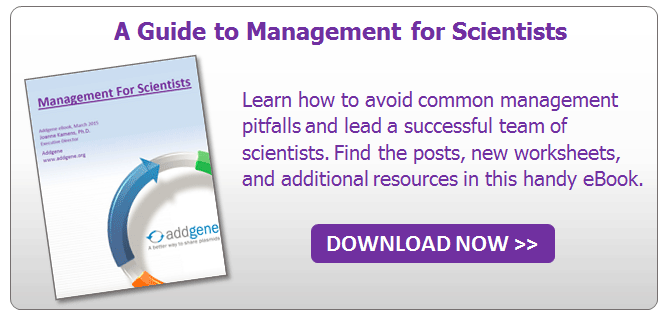 This post was contributed by Dora Farkas of www.FinishYourThesis.com and is one of many posts in our career series.
This post was contributed by Dora Farkas of www.FinishYourThesis.com and is one of many posts in our career series.
Do you have a difficult supervisor, or do you have to work with difficult people? Each time I ask this question at my workshops, I get nods from nearly every participant.
Robert Bramson, author “Coping with Difficult People,” identified seven types of difficult people:
- Hostile-aggressives, who are usually antagonistic and impolite,
- Complainers, who spend most of their time moaning about their troubles,
- Silent or unresponsive clams, who seem to ignore you and your questions,
- Super-agreeable friendly types, who don’t follow through on their promises,
- Wet-blanket negativist, who can bring down the morale of a group with their pessimism,
- Know-it all experts, who think their way is the only right way, and
- Indecisives, who keep changing their minds and have trouble making decisions.
In my work as a thesis coach for graduate students, I heard about supervisors in all of the above categories. In addition, I also learned about two other kinds of difficult supervisors:
- Hands-off super busy types, who never have time to mentor you, and
- Micromanagers, who question every detail of your project and work hours.
While specific strategies to deal with each of these personality types is beyond the scope of this article, there are a few principles that will help you resolve most conflicts, even with difficult people. If I had to use one word for to summarize these principles it would be “assertiveness.”
7 strategies to become more assertive & resolve conflicts
What Is Assertiveness? An assertive person is able to communicate their ideas confidently while also considering the needs of other people. Some students and postdoctoral fellows are hesitant about expressing their ideas, especially if their supervisors are difficult people.
The following seven strategies will help you to become more assertive and resolve disagreements with your supervisor, even if he or she is a difficult person:
1) Understand your supervisor’s expectations
2) Prepare an agenda for every meeting
Supervisors are busy and your work is just one of the hundred things on their minds. When you come to a meeting with a clear agenda, you will immediately get your supervisor’s attention so you can focus on the problems that need to be resolved. If there are any forms that need to be signed, or manuscripts that need to be reviewed, bring them to the meeting. This will make it easy for your supervisor to support you.
3) Explain the problem and leave your emotions out of the discussion
Do not assume that your supervisor is familiar with the minute details of your work. Describe the problem by stating the facts and explain how it is interfering with your work. Avoid talking about your emotions, such as frustration or anger, because your discussion will get side-tracked, and you might create even more conflicts.
4) Define in advance how you would like the problem to be resolved
You know more about your work than your supervisor does. You can save yourself and your supervisor some time if you come to every meeting with one or more proposals to resolve your problem. Your supervisor will appreciate that you took the time to think of solutions, and will be more likely to view your proposals favorably.
5) Listen to your supervisor’s viewpoint and brainstorm about mutually beneficial solutions
Your supervisor might not agree with all of your ideas, but he or she probably has reasons for it. Do not take criticism personally or get defensive. Look at the problem from their viewpoint, and brainstorm about solutions that will meet both of your needs.
6) Put important agreements in writing
One of the most frequent sources of conflict is miscommunication. For example, you might misunderstand your supervisor’s suggestions and take your project in the wrong direction. The best way to avoid miscommunication is to follow up after every meeting with an email that summarizes what you have agreed upon and your action items. This will give your supervisor a chance to review what you have discussed and add suggestions if needed.
7) Always follow through on your end of the deal
When you meet with your supervisor, prioritize your action item list and set some approximate timelines. Be sure that you keep your commitments, and if for some reason you are not able to, let your supervisor know as soon as possible. In order to build trust between you and your supervisor, you need to demonstrate that they can count on you to follow through on your commitments.
Assertiveness is a skill that will help you to resolve both personal and professional conflicts. At the workplace, these strategies will help you to communicate with confidence earn respect from your supervisor. Whenever possible, discuss important issues in person or over the telephone instead of email. As you cannot see a person’s body language or sense their tone of voice in an email, there is a high likelihood of miscommunication, which can lead to even more conflicts.
If your supervisor is a difficult person, the above strategies will still be helpful but you will need to be more assertive to get your point across. Some supervisors might try to intimidate you with negative comments (hostile-aggressives, complainers, know-it all experts, wet-blanket negativists, and micromanagers), while other supervisors might be nice people, but poor mentors (super-agreeable friendly types, indecisives, and super busy types). If you supervisor ignores you even when you meet in person (silent or unresponsive clam), you will probably need support from your colleagues or other supervisors to complete your work.
Whether your supervisor is a negative person or just an inexperienced manager, you can resolve most conflicts if you communicate your ideas assertively, listen to his or her viewpoint, and discuss options for mutually beneficial solutions.
If you package your challenges with your supervisor into learning opportunities as you are advancing career, you will become the independent, assertive, and proactive person that all employers are eager to hire.
An excellent resource to learn more about assertiveness skills is Dale Carnegie’s book “How To Win Friends and Influence People.”
Thank you to our guest blogger!
 Dora Farkas received her Ph.D. from MIT and is the Founder of Finish Your Thesis, an online community that has supported thousands of graduate students since 2009. Dora is also the creator of the “Finish Your Thesis” online course. To learn more about her site please visit www.FinishYourThesis.com.
Dora Farkas received her Ph.D. from MIT and is the Founder of Finish Your Thesis, an online community that has supported thousands of graduate students since 2009. Dora is also the creator of the “Finish Your Thesis” online course. To learn more about her site please visit www.FinishYourThesis.com.
Additional Resources
-
Getting the Most Out of Supervisor Meetings by Joanne Kamens on Bitesize Bio
-
Good communication with your PhD supervisor/scientific advisor by Joanne Kamens on BitsizeBio
Additional Resources on the Addgene Blog
- Read our "Management for Scientists" series
-
More science career articles on our blog
- Read Joanne Kamen's Post on What Makes a Good Mentor
Resources on the Addgene Wesbite
- Find plasmids to Expedite Your Experiments and Achieve Your Research Goals


Topics: Science Careers, Management for Scientists





Leave a Comment